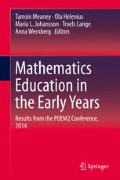Abstract
Let’s Count is a new Australian early mathematics initiative that aims to promote positive mathematical experiences for young children (3–5 years) as part of families’ everyday activities. The 154 children who experienced Let’s Count in 2013 demonstrated noteworthy growth in their mathematical knowledge from the beginning of their preschool year to its end. On almost every measure, the Let’s Count cohort bettered the performance of the comparison groups, with some measures showing statistically significant differences. This suggests that educators and families working in partnership to assist young children to notice, explore and discuss the mathematics they encounter during everyday experiences had a positive effect on children’s construction of mathematics.
Access this chapter
Tax calculation will be finalised at checkout
Purchases are for personal use only
References
Australian Curriculum, Assessment and Reporting Authority (ACARA). (2013). The Australian curriculum: Mathematics v2.4. Retrieved from: http://www.australiancurriculum.edu.au/Mathematics/Curriculum/F-10.
Bobis, J. (2002). Is school ready for my child? Australian Primary Mathematics Classroom, 7(4), 4–8.
Clarke, D. M. (2001). Understanding, assessing and developing young children’s mathematical thinking: Research as powerful tool for professional growth. In J. Bobis, B. Perry, & M. Mitchelmore (Eds.), Numeracy and beyond: Proceedings of the 24th annual conference of the Mathematics Education Research Group of Australasia (pp. 9–26). Sydney: MERGA.
Clarke, D., Cheeseman, J., Gervasoni, A., Gronn, D., Horne, M., McDonough, A., et al. (2002). ENRP final report. Melbourne: ACU.
Clarke, B., Clarke, D. M., & Cheeseman, J. (2006). The mathematical knowledge and understanding young children bring to school. Mathematics Education Research Journal, 18(1), 78–102.
Department of Education, Employment and Training. (2001). Early numeracy interview booklet. Melbourne: Department of Education, Employment and Training.
Fuson, K. (1992). Research on whole number addition and subtraction. In D. A. Grouws (Ed.), Handbook of research on mathematics teaching and learning (pp. 243–275). New York: Macmillan.
Gervasoni, A., & Lindenskov, L. (2011). Students with ‘special rights’ for mathematics education. In B. Atweh, M. Graven, W. Secada, & P. Valero (Eds.), Mapping equity and quality in mathematics education (pp. 307–323). Dordrecht: Springer.
Gervasoni, A., Parish, L., Hadden, T., Turkenburg, K., Bevan, K., Livesey, C., et al. (2011). Insights about children’s understanding of 2-digit and 3-digit numbers. In J. Clark, B. Kissane, J. Mousley, T. Spencer & S. Thornton (Eds.), Mathematics: Traditions and [new] practices. Proceedings of the 23rd biennial conference of The AAMT and the 34th annual conference of the Mathematics Education Research Group of Australasia (Vol. 1, pp. 315–323). Alice Springs: MERGA/AAMT.
Gervasoni, A., Parish, L., Upton, C., Hadden, T., Turkenburg, K., Bevan, K., et al. (2010). Bridging the numeracy gap for students in low SES communities: The power of a whole school approach. In L. Sparrow, B. Kissane, & C. Hurst (Eds.), Shaping the future of mathematics education. Proceedings of the 33rd annual conference of the Mathematics Education Research Group of Australasia (pp. 202–209). Fremantle: MERGA.
Gervasoni, A., & Perry, B. (2013). Children’s mathematical knowledge prior to starting school. In V. Steile (Ed.), Mathematics education: Yesterday, today and tomorrow. Proceedings of the 36th annual conference of the Mathematics Education Research Group of Australasia (pp. 338–345). Melbourne: MERGA.
Gervasoni, A., & Perry, B. (2015). Children’s mathematical knowledge prior to starting school and implications for transition. In B. Perry, A. MacDonald, & A. Gervasoni (Eds.), Mathematics and transition to school—International perspectives. Dordrecht: Springer.
Ginsburg, H. P., & Seo, K.-H. (2000). Preschoolers’ mathematical reading. Teaching Children Mathematics, 7(4), 226–229.
Gould, P. (2000). Count me in too: Creating a choir in the swamp. In Improving numeracy learning: What does the research tell us? Proceedings of the ACER research conference (pp. 23–26). Melbourne: Australian Council for Educational Research.
Gould, P. (2012). What number knowledge do children have when starting kindergarten in NSW? Australasian Journal of Early Childhood, 37(3), 105–110.
Hunting, R., Bobis, J., Doig, B., English, L., Mousley, J., Mulligan, J., et al. (2012). Mathematical thinking of preschool children in rural and regional Australia: Research and practice. Melbourne: Australian Council for Educational Research.
Mulligan, J. (1998). A research-based framework for assessing early multiplication and division. In C. Kanes, M. Goos & E. Warren (Eds.), Teaching mathematics in new times. Proceedings of the 21st annual conference of the Mathematics Education Research Group of Australasia (Vol. 2, pp. 404–411). Brisbane: MERGA.
Perry, B., & Dockett, S. (2008). Young children’s access to powerful mathematical ideas. In L. D. English (Ed.), Handbook of international research in mathematics education (2nd ed., pp. 75–108). New York: Routledge.
Perry, B., & Gervasoni, A. (2012). Let’s Count educators’ handbook. Sydney: Smith Family.
Steffe, L., von Glasersfeld, E., Richards, J., & Cobb, P. (1983). Children’s counting types: Philosophy, theory, and application. New York: Praeger.
The Smith Family (2013). Who we are. Retrieved from: http://www.thesmithfamily.com.au/.
Wright, R., Martland, J., & Stafford, A. (2000). Early numeracy: Assessment for teaching and intervention. London: Paul Chapman.
Acknowledgement
Let’s Count was commissioned by The Smith Family and is supported by the Origin Foundation and developed in partnership with BlackRock Investment Management.
Author information
Authors and Affiliations
Corresponding author
Editor information
Editors and Affiliations
Rights and permissions
Copyright information
© 2016 Springer International Publishing Switzerland
About this chapter
Cite this chapter
Gervasoni, A., Perry, B. (2016). The Impact on Learning When Families and Educators Act Together to Assist Young Children to Notice, Explore and Discuss Mathematics. In: Meaney, T., Helenius, O., Johansson, M., Lange, T., Wernberg, A. (eds) Mathematics Education in the Early Years. Springer, Cham. https://doi.org/10.1007/978-3-319-23935-4_7
Download citation
DOI: https://doi.org/10.1007/978-3-319-23935-4_7
Published:
Publisher Name: Springer, Cham
Print ISBN: 978-3-319-23933-0
Online ISBN: 978-3-319-23935-4
eBook Packages: EducationEducation (R0)

